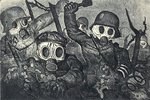michaelmaltby
Colonel
@buffnut453:
"... the way the Germans, themselves, thought they were treated after WWI. The country was effectively neutered, given no opportunity to defend itself properly. There were various land-grabs by the Allies, particularly the French, which continued long after WWI had ended"
Hey - lets move the yardsticks back to the Franco-Prussian war - when the French were humiliated and had territory seized by the Germans. I mean - if we are going to accept "sorry for myself" arguments - why start with 1918 .
.
Was France vindictive as Hell in 1918? Was there hatred for the "Bosch"? - damn right there was. Was it justified ... well it was just as valid as the way Germans felt they were treated.
You have to draw a line somewhere, buffnut, and accept that each of us is responsible for our choices and our actions. Blaming others doesn't cut it.
My grand dad and two uncles didn't go to France in 1914 to return again in 1939 because the Germans hadn't learned a thing from the first go-round. But the uncles DID go back to war in 1939 - grand dad died in '39 - disgusted and disappointed, I'm sure.
MM
"... the way the Germans, themselves, thought they were treated after WWI. The country was effectively neutered, given no opportunity to defend itself properly. There were various land-grabs by the Allies, particularly the French, which continued long after WWI had ended"
Hey - lets move the yardsticks back to the Franco-Prussian war - when the French were humiliated and had territory seized by the Germans. I mean - if we are going to accept "sorry for myself" arguments - why start with 1918
Was France vindictive as Hell in 1918? Was there hatred for the "Bosch"? - damn right there was. Was it justified ... well it was just as valid as the way Germans felt they were treated.
You have to draw a line somewhere, buffnut, and accept that each of us is responsible for our choices and our actions. Blaming others doesn't cut it.
My grand dad and two uncles didn't go to France in 1914 to return again in 1939 because the Germans hadn't learned a thing from the first go-round. But the uncles DID go back to war in 1939 - grand dad died in '39 - disgusted and disappointed, I'm sure.
MM
Last edited:


 Knowing that makes the poem all the more poignant. Gonna have to add it to my archives....
Knowing that makes the poem all the more poignant. Gonna have to add it to my archives....